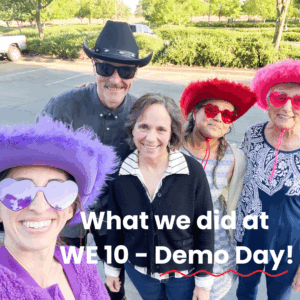Productivity: Energy Management is Time Management
“Every now and then go away, have a little relaxation, for when you come back to your work your judgment will be surer; since to remain constantly at work will cause you to lose power of judgment…” (Leonardo da Vinci)
I love the topic of time management. I first became interested in this topic when I began coaching attorneys. I met several attorneys who wanted coaching on bringing in new clients, transitioning to a different type of practice, or building their business, but always the first thing they said to me was, “I don’t have time to work on this.” Sometimes they would pay me and then not have the time to meet with me. Advancing to the next level in their business was usually impeded by their sense that they did not have the time. So I began coaching to concepts of time management and did a lot of research in this area.
I found that, surprisingly, much of the challenge of time management is really a challenge of energy management–both mental and physical. And yet, most people do not think about managing their energy, or about the relationship it has to how much they get done in a given day.
If you are self-employed or work in a job where you have a level of autonomy that allows you to structure your own day, you have (consciously or unconsciously) developed a method of working throughout the day, as opposed to someone else telling you when and how to do your job. What is your method for staying engaged and productive?
Energy Management
When I was a young adult, I always felt I had the time to accomplish anything. I held a belief that if I could not get it all done during the day, I could stay up as late as I needed. Having no family, this carried me easily through college and law school and even many of my first years as a practicing attorney. Then I hit a wall. It was weird. There I was at 1 am with my cup of coffee and my brief and the strangest thing happened: I started to fall asleep! And more coffee did not help. Well, I thought, surely this is an anomaly; “maybe I am getting sick.” So I went to bed. And another strange thing happened: I was tired the next day. I kept drinking coffee but I kept being tired. And I mean falling-asleep-standing-up tired. I was really surprised. I thought something was wrong. I went to the doctor. And ultimately what I realized was I could no longer force myself to access energy that I did not have. This was a scary thought, especially given that I believed the reason I was able to achieve anything I wanted was because I could stay awake for long periods of time and be productive.
In speaking on “time management” other the years, I have discovered that effective time management requires a paradigm shift. It requires us to question the way we are doing things; the way we are viewing things; what we choose to do; and what we choose not to do. It means that when I have a lot of work to do, rather than working harder or faster, doing more things at once and drinking more coffee, I shift my way of approaching the situation.
Energy management is a part of this shift. As a concept, energy management has two parts:
The first goal of energy management is to determine when you are most awake, productive, and resourceful; and then do your most challenging work at that time. The work you do when you are feeling most energetic and focused will be more efficient and effective.
The second goal of energy management is to notice when your energy starts to wane and, rather than “pushing through” and drinking a Red Bull, do something to acknowledge the lack of energy and to intentionally rebuild it. So take a break if you are tired; then do something more energizing in order to bring yourself back to a place where you are most effective. This is a different paradigm – a different way of viewing time management that says when you are intentional with your energy, you will be more effective, waste less time and ultimately be more productive.
There are two types of energy: physical and mental. They overlap to a great extent. Generally, physical energy comes from eating well, getting enough sleep, and exercising. Mental energy is a reflection of various factors such as whether you’re in a good mood, whether your thoughts are positive or negative and whether you feel good about what you are doing. Your mental energy affects your physical well-being. Ancient Greek philosophy was “healthy body healthy mind.” By the same token, physical energy can be affected by your mental state. If mentally you feel sad or depressed, your body moves more slowly. If you feel happy or excited, your body will move more quickly; you have more physical energy.
As with any change you wish to make, the first step is always self-observation. Ask yourself:
1. What drains you of your energy? (For example – some relationships, some obligations, some types of work, certain habits like staying up late, watching too much TV, etc.)
2. What gives you energy? (Certain foods, types of activities, certain people, conversations, weather, locations, etc.)
3. When are you most alert? Do you make the most of this time?
4. When are you least alert? What can you do with this time?
When you begin to observe and learn about yourself in this way, you can consciously work with your energy rather than against it. This means working when you have energy rather than simply having another cup of coffee. This means choosing activities that improve your energy. It means remaining in tune with how you feel and taking a break when you need it, knowing that ten minutes spent walking around the building will actually make you more productive than “pushing through” when you feel drained.
Tips to Increase Energy
1. Exercise. For most people, exercising helps increase energy and strength levels. Exercise that improves the efficiency of your heart and breathing increases blood flow and results in more energy. This energy enables you to be more productive in other areas of your life. Exercise also improves your sleep.
2. Get 7-8 hours sleep a night. Sleep restores your body. A good night’s sleep helps with alertness, concentration and the capacity to cope with stressful situations and get along with people.
3. Call people you enjoy talking with. This will give your mood a lift which in turn raises your mental energy. Of course, the same will not be true if your conversation turns to topics that bring you down.
4. Do something challenging or scary. This will raise your adrenaline, increase blood flow and also increase your confidence, which also raises energy. Doing things outside your comfort zone is a way to send yourself a message – “I am up to this task!” – which increases confidence, and puts a spring in your step! (Note, you don’t need to jump out of an airplane every time your energy lags. Try calling that person you have been avoiding. Try striking up a conversation with a stranger – whatever stretches your comfort zone.)
5. Take a nap. Research shows a brief nap increases focus and energy.
6. Drink 8 glasses of water a day. According to some sources, up to 60% of the human body and 70% of the brain consists of water. For the brain to function at full capacity it must have adequate water. Lack of water will make you tired. Functionally, reaching for water when you are tired is more effective than reaching for coffee.
7. Dance. This is helpful not only because it will make you feel better. It also comes under the useful principle — “act as if.” When you act as if you have energy, it can give you energy.
Now how about you – what boosts your energy? We would love to hear!
The “… most productive lives are characterized by the ability to fully engage in the challenge at hand, but also to disengage periodically and seek renewal. ” (Loehr and Schwartz)






